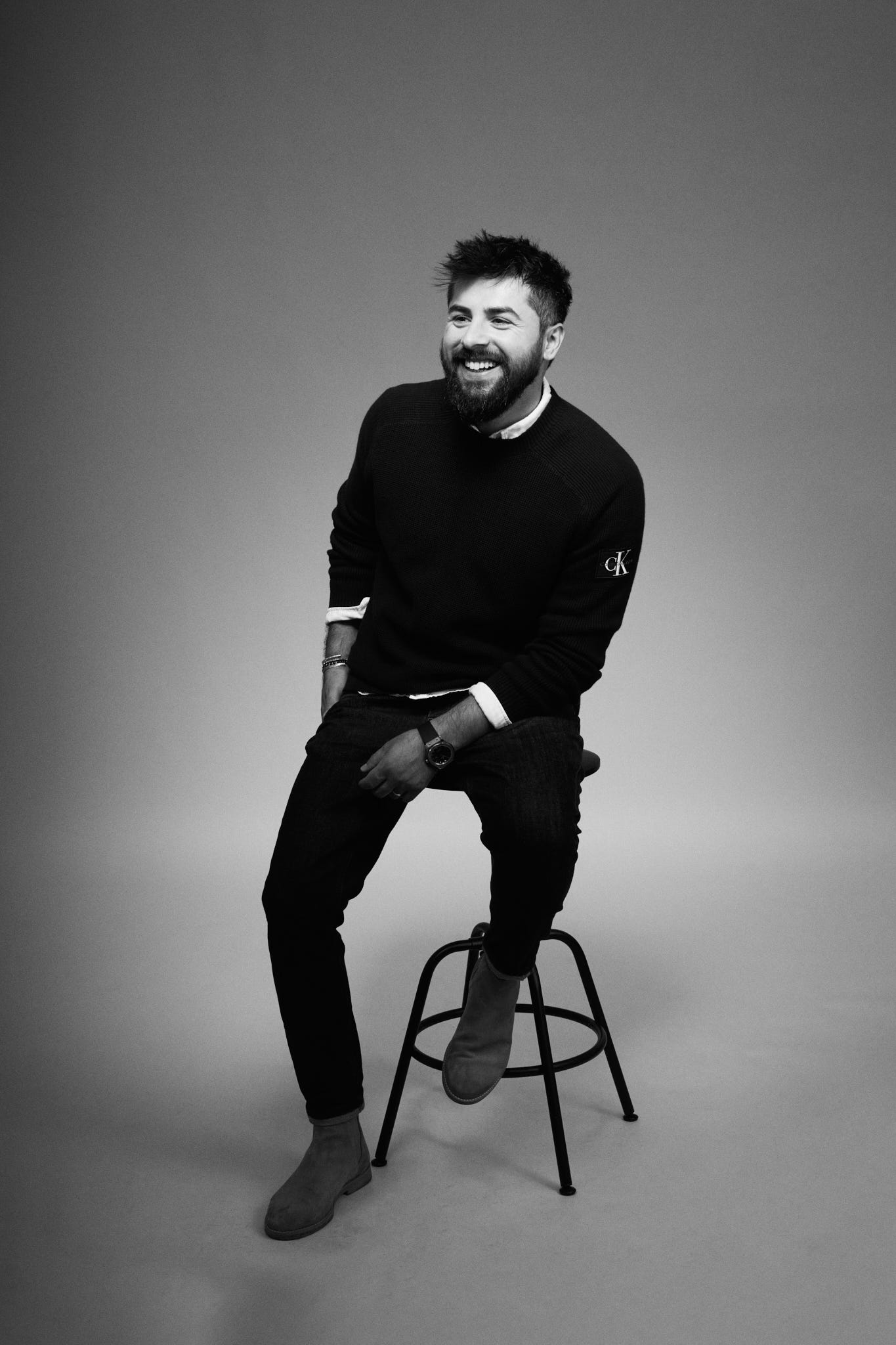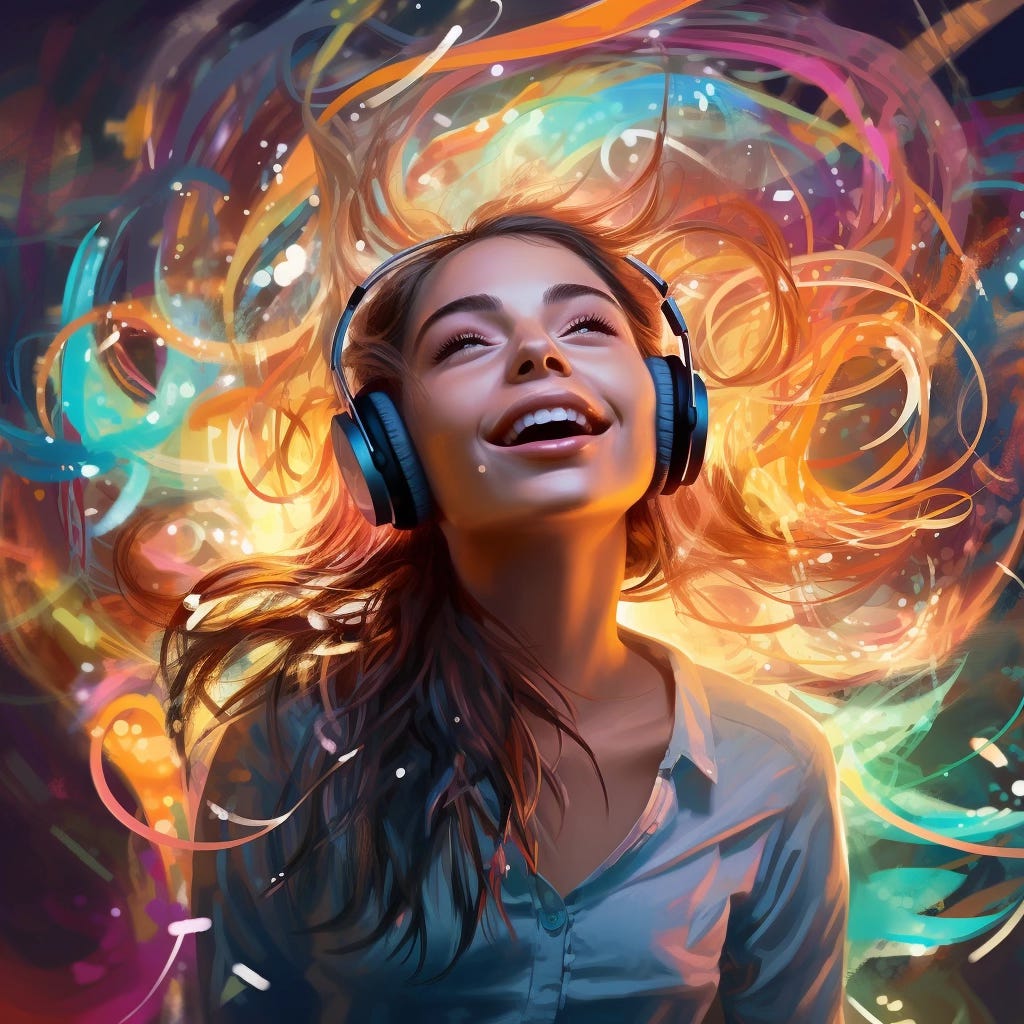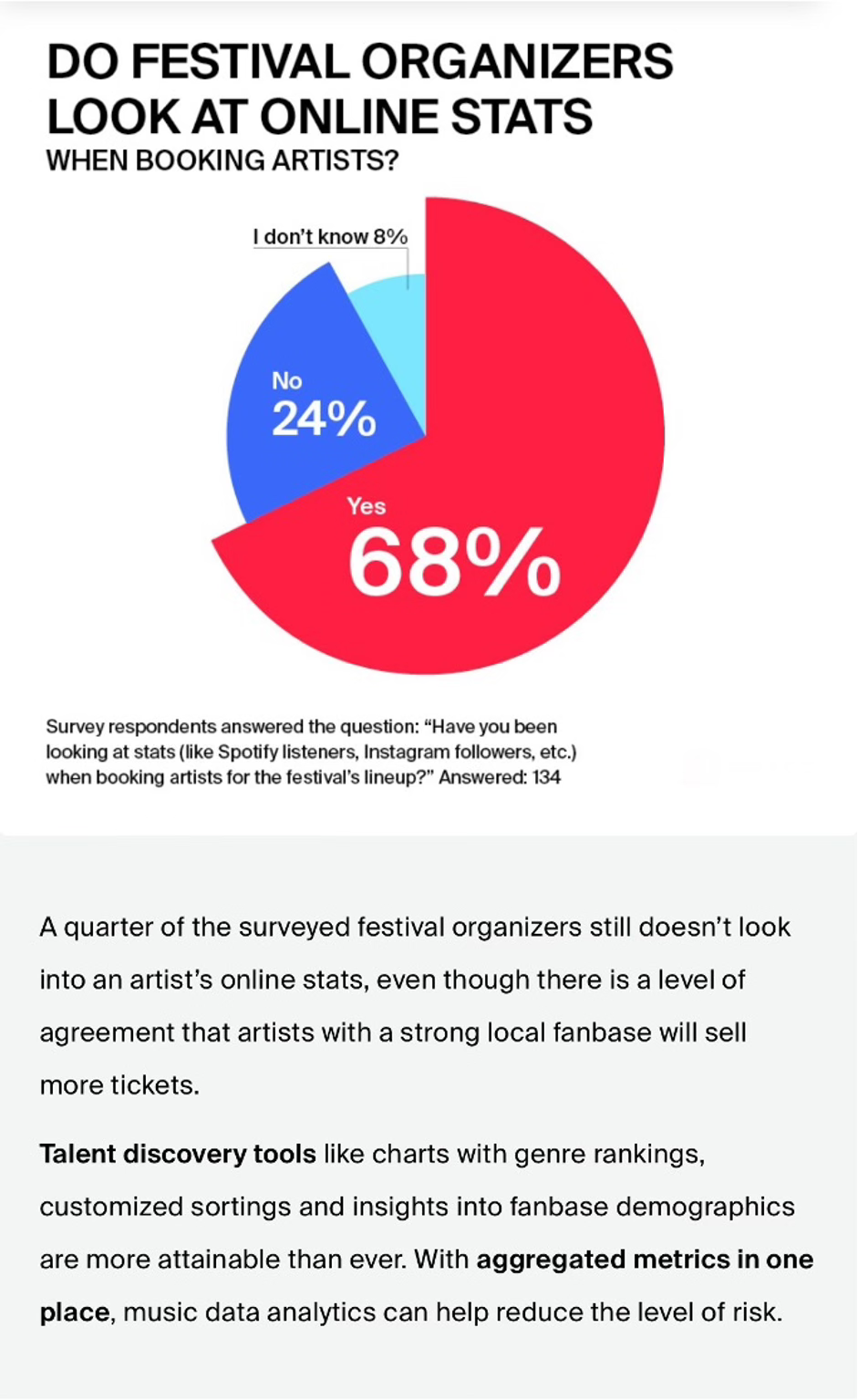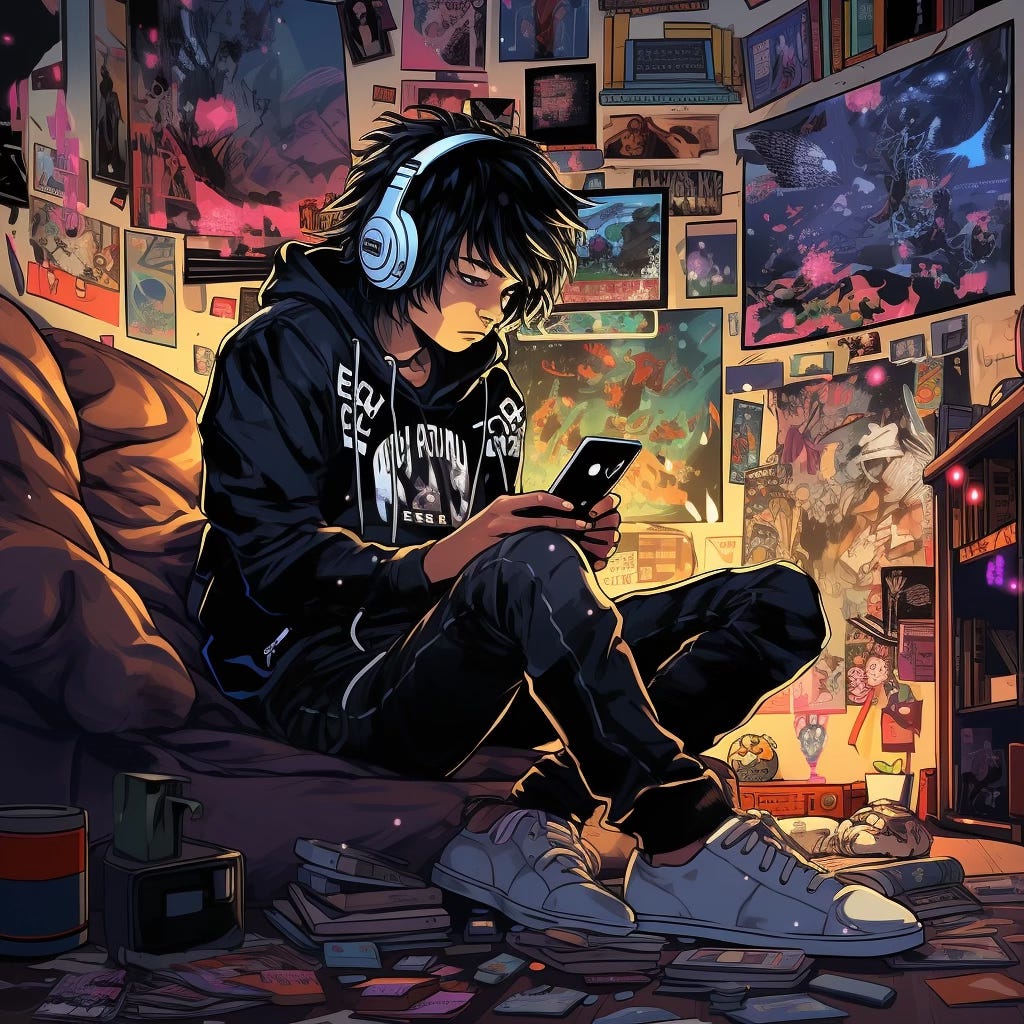Inside Stories: The Music Scene's Dos and Don'ts, Through The Eyes Of A Musicpreneur
Based on his experience of working with a lot of A-list artists, Bogdan Niță shared us a few insights about how to build a music career as a young artist
Yes, we may sound like a broken record, repeating the same thing over and over again! But the internet revolution has changed the music industry from the ground up. And now, at the dawn of the AI-powered tech, most of us will find themselves like our grandparents trying to control their A/C through a smartphone 🫣 Yet, some things will never change: the need for artists to establish a real human connection with their fans, done exactly as it was done 50 years ago: live performances, tours, small events, festival appearances, meet & greet sessions. Seen in the light of ever decreasing royalty payments for the artists, concerts will stay as the main income source for them. But how can artists attract a decent audience for live performances, as Gen Z is notoriously addicted to a screen? How can one artist be a successful live artist and still be relevant on social media? Is it all about how consistent a marketing budget is or all you need is good music and a tour bus?
Bogdan Niță has been involved in the music industry for over 19 years. His forward-thinking approach and innovative strategies brought him close to an impressive number of Romanian A-list artists: INNA, Carla’s Dream’s, Guess Who, Minelli, Alexandra Stan or Sasha Lopez, to name a few. Beside managing artists and handling their bookings, he’s working also with Untold, Neversea, Electric Castle or Saga as a booking advisor. A true musicpreneur (a definition of this term will follow below :D), Bogdan seems like the perfect guy to answer our questions. The interview turned out into an excellent guidebook for both artists and managers who wish to adapt to the ever changing music scene and at the same time keep the artistic act alive and relevant to their fans. Read on and enjoy the conversation as much as we did!
If you haven’t subscribed to our newsletter yet, it’s time to do it. Music promo tips & tricks, detailed music marketing strategies as well as tools that would make your independent artist life way easier. Hit the subscribe button below.
How did you end up working in the music industry? Is there any musical background in your career?
My journey into the music industry was a combination of passion and opportunity. While I didn't have a formal musical background, I was always captivated by the power of music to connect people. I started my career as a radio DJ, and afterward, I dabbled in the written press. To cut a long story short, in 2005, I began working in entertainment as a club manager and promoter, utilizing my natural networking skills. This eventually led to managing artists and handling their bookings (Romanian and international artists). It has been a path filled with continuous learning, adaptation, and innovation at every turn.
What does a musicpreneur do differently, compared with, let’s say an artist manager?
A musicpreneur combines the creative passion of an artist with the strategic mindset of an entrepreneur. Unlike an artist manager, who focuses on the career trajectory of artists, a musicpreneur looks at the broader picture — the ecosystem of music creation, distribution, and consumption — and finds innovative ways to navigate and shape that space. This is a topic that I have addressed several times in the public space. In my view, the best definition of this job would be: A MANAGER has the role of taking the artist's vision, providing the appropriate context to make it achievable while maintaining some business proportions in relation to reality.
From your impressive artist roster, I can tell you’re working mainly with A-List artists. Have you considered working with a young promising artist, at the beginning of his / her musical career? What would it take to grow an artist from the ground up?
Working with Emerging Artists is not easy. This question needs to have a more complex response. Please bear with me. Absolutely, I believe in nurturing and developing talent from the ground up, and it's an aspect of my work that I'm truly passionate about. While it's true that I have had the privilege of working with A-List artists like The Motans, Grasu XXL, Irina Rimes, INNA, Antonia, Guess Who, Carla’s Dreams, Theo Rose, Andre Rizo & Co – also see immense potential in young, promising artists at the start of their musical careers.
Growing an artist from the ground up requires a combination of factors:
First of all I think they have to possess talent and originality. The artist should possess genuine talent and a unique sound or style that sets them apart from the crowd. Originality is often a key factor in capturing audience attention.
They need to cultivate a strong work ethic. Hard work, dedication, and a commitment to honing their craft are crucial for a young artist's growth. Consistent practice and improvement are essential in my opinion. They understand when it is important to make a concession and when not.
The quality of music production is also very important. Investing in high-quality music production, including recording, mixing, and mastering, is vital. The music should be of professional quality to compete in the industry.
Effective Promotion and Marketing. The most important aspect for an artist's career is to build a fan base and create a strong online presence. Utilizing social media, music streaming platforms, and engaging with fans is key to gaining visibility.
Live Performances. Performing live helps artists connect with their audience and gain experience. It's a crucial part of building a reputation and attracting a following. Unfortunately in Romania small venues (underground venues) have disappeared. Rising rents, taxes, the lack of government support for the cultural sector have all contributed to the disappearance of these venues. In practical terms, one of the few offline platforms for artists to emerge has significantly diminished, along with the opportunity to experiment and test their art on a niche audience. In my opinion, these spaces were cultural hubs that fostered the development of artists with substance. Many bands started in the underground scene and were later brought into the mainstream by the audience, becoming successful brands. They had the opportunity to showcase their talents and consistently perform, improving their live shows in these venues.
Networking. Building relationships within the industry, including with talent agents, promoters, and fellow musicians, can open doors to opportunities for collaboration and exposure.
Mentorship. Having a mentor or manager who believes in the artist's potential can provide guidance, connections, and valuable insights. As I explained on my blog, the notoriety of a manager can open doors for you, but it can also close them. Their networking capabilities are an extremely valuable intellectual asset, alongside their know-how, communication skills, a business-oriented mindset, staying connected to market trends, and being innovative. In recent years, my experience has shown me that as a manager, you need several important qualities: trust, instinct, passion, courage, and financial sense. I have always emphasized the difference between being smart and being intelligent. Many people are smart because they research, read, assimilate information, and filter it through their own lens, whereas intelligent individuals are born with a natural brilliance. From a personal perspective, I would look for a creative individual, a blend of being smart and emotionally intelligent. To solve a problem, it must be deeply understood and resolved with a real solution.
Resilience. The music industry can be challenging, and setbacks are common. Resilience and the ability to learn from failures are important for long-term success. Rejections aren’t setbacks, they actually push you forward, because they force you to change.
In conclusion, working with young, promising artists is not only an investment in their future but also an opportunity to be part of their artistic journey and witness their growth firsthand. It's a rewarding experience to see an artist evolve and achieve success from the ground up, and I'm open to exploring such collaborations in addition to my work with established artists.
In today's digital age, creativity is the new currency.
Do you have any success story for an artist who went from zero to hero?
There are several artists I've worked with who've gone from being virtually unknown to chart-topping successes. Their journeys are a testament to their artistry and the strategic planning we put into their careers, focusing on building a loyal fanbase and leveraging the right opportunities at the right time. I wrote a study case on my blog about one of them.
100K songs released every day on Spotify, social media platforms flooded with content from artists aiming to get viral and breakthrough, organic reach going as low as a ever on these platforms. How can one artist with good music and no huge marketing budgets ever stand a chance, besides a high dose of sheer luck?
In today's digital age, creativity is the new currency. Artists with limited budgets can leverage social media to build a community around their music. It's about engaging with your audience, telling your story, and using the tools available to you in the most authentic way possible. Let me be more precise about stats: only on Spotify are uploaded more than 100.000 songs daily. You have to understand the behavioural consumer and create a strategy around top problems you identify. I will try to give you some examples from my personal notes:
Identify your niche. Find your niche and target audience. Understand who your music appeals to the most, and tailor your content to meet their interests and preferences. Focusing on a specific niche can help you stand out.
Quality music production. Start with high-quality music production. Invest time and effort in creating exceptional music that resonates with your target audience and a strong sonic branding. The foundation of any successful music career is compelling, well-produced tracks.
Consistent branding. Develop a strong and consistent brand identity. This includes your visual style, messaging, and overall image. A recognisable brand can help you cut through the noise and build a loyal following.
Engage with your audience: Actively engage with your fans and followers. Respond to comments, messages, and interact with your audience on social media. Building a genuine connection can create a brand affinity in your community..
Content Strategy: Create a content calendar and plan your releases strategically. Consistency in posting new content, whether it's music, videos, or behind-the-scenes glimpses, can keep your audience engaged. Now more than ever, artists are not only good interpreters or musicians. They are creators.
Collaborate with other artists, both within and outside your genre. Cross-promotion can introduce your music to new audiences. You need to understand the importance of fan base converting.
Live Performances. When possible, perform live, even if it's through virtual concerts. Live shows can create a deeper connection with fans and attract new listeners.
Data Analysis. Use analytics to understand what's working and what's not. Platforms like Spotify and social media offer insights into your audience's behaviour. Adjust your strategy based on these insights.
So an artist nowadays is not just a musician, but more like a content creator, trying to tell a story, sharing more bits of his personal life than ever before, right?
Today's artists need to be multifaceted. Creating music is just one part of their brand; they also need to engage fans with their story and personality. This holistic approach to artistry is what helps build a lasting connection with audiences.
The general feel is that bookings are made nowadays based on how strong one artist’s social media presence is (in terms of followers, reach a.s.o.). No festival or club seem to take the risk on promoting young, yet to be discovered talents. On the other side and considering the question above, thousands of artists are competing with each other to attract new listeners and fans, mainly in the digital world. Seems like a vicious circle and the fresh artists are the big losers here. How can we break this vicious circle?
To break this cycle, we need to create more platforms that spotlight emerging talent. This includes encouraging festivals and venues to dedicate slots to new artists and supporting initiatives that focus on artist development beyond just the numbers on social media. The music industry needs to go back to pure A&R and gut instincts. At some point it can't just be metrics and data. Everyone goes after the same artists based on buzz or streaming numbers but sometimes we just need pure talent.
Breaking the vicious circle of bookings primarily based on social media presence and the struggle of emerging artists to gain recognition is indeed a significant challenge in the music industry. To address this issue and create a more balanced and equitable ecosystem, several steps can be taken for example diversifying booking criteria.
Festivals and clubs can diversify their criteria for booking artists. While social media presence is important, it shouldn't be the sole determining factor. Consider factors like talent, potential, uniqueness, and the artist's ability to deliver a great live performance.
Festivals and clubs can adopt a curatorial approach, where experienced curators or talent scouts actively seek out and select promising artists based on their artistic merit rather than just popularity.
Allocate stages or time slots specifically for emerging artists at festivals and clubs. This showcases fresh talent and encourages attendees to explore new sounds. We have some festivals that are supporting upcoming artists and some venues like Expirat, Control, /Form Space and others.
Raise awareness among music enthusiasts about the importance of supporting emerging artists. Encourage listeners to explore and champion new talent.
Foster transparency in the booking process. Artists should have access to information on how bookings are made and what criteria are considered.
Offer workshops, seminars, and networking events to help emerging artists understand the industry better and connect with industry professionals. Mastering the Music Business Conference is a good start. Personally the project that gained my attention was "Women in Music’.
Breaking the vicious circle will require a collective effort from artists, industry stakeholders, and music enthusiasts. By reevaluating booking criteria, offering support, and actively promoting emerging talent, we can create a more inclusive and diverse music scene where young artists have a better chance to thrive.
Gen Z listeners: consuming short forms of media content, an attention span of fractions of a second, jumping from one trend to the next one in a matter of seconds. How would this affect the music industry in the coming years? Will we ever come back to the pleasure of listening a full album with songs longer than 2 minutes each?
While short-form content is popular, I believe there will always be an audience for full-length albums. They offer a different experience — a journey through an artist's vision. The key is to balance the instant gratification of a single with the depth of an album.
However, it's essential to note that while the music industry will adapt to accommodate changing listening habits, the desire for full albums with longer songs is unlikely to disappear entirely. Artists who value the album as an artistic statement may continue to create them, even if they coexist with shorter, trend-driven tracks.
In conclusion, the music industry is evolving to meet the demands of Gen Z listeners, with shorter formats and attention-grabbing content. While this trend will persist, there will still be room for the timeless pleasure of listening to full albums especially among those who seek a deeper and more immersive musical experience.
More and more voices say that the labels are becoming obsolete in the DIY context, as artists can self publish their music, create marketing campaigns with a few clicks, promote on social media. How do you feel about this?
While the DIY approach empowers artists, labels still play a crucial role in scaling careers, providing resources and networks that are hard to build independently. The industry is evolving, and labels must adapt to provide value in new ways.
Algorithms based music curation vs human music curation. Algorithmic playlists vs editorial /human curated playlists: which ones will stand the test of time?
Both have their place. Algorithmic playlists are great for discovery, but human curation brings context and storytelling to music, which algorithms can't replicate. I believe a hybrid model will persist, where technology and human insight work in tandem.
With AI getting more and more power and presence in our daily routine, with DSPs getting bigger and bigger, with young generations choosing to spend their time in front of a screen instead of a festival stage, how do you see the music scene in the coming years?
The music scene is becoming more decentralized and diverse. With technology's role ever-increasing, I see a future where artists have more control over their careers, and where virtual and augmented reality might play a bigger part in how we experience music. There's a shift towards more immersive, personalized experiences, and while the mediums may change, the essence of connecting through music will remain the same.
Artists and industry stakeholders will need to adapt to these changes to thrive in the evolving music landscape.





